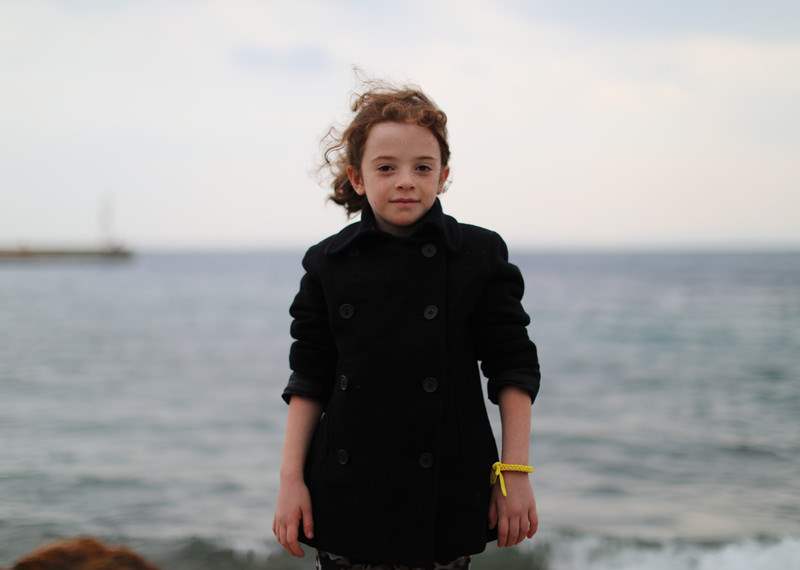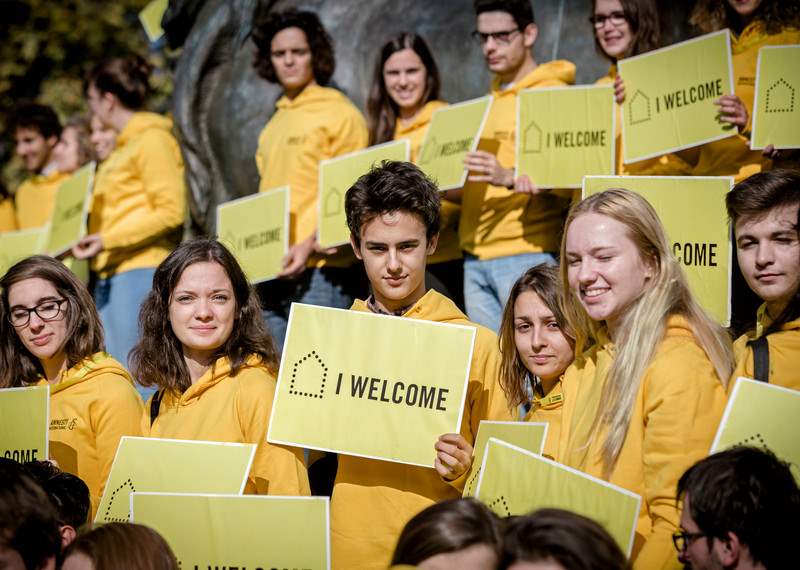Family Members of Asylum Seekers Can Go Back to Their Countries
Every 24-hour interval, all over the world, people make i of the well-nigh difficult decisions in their lives: to exit their homes in search of a safer, improve life.
Most people in the world accept had the experience of leaving the place where they grew up. Maybe they will simply move equally far as the next village or metropolis. Only for some people, they will need to leave their state entirely – sometimes for a short fourth dimension, simply sometimes forever.
At that place are many reasons why people around the globe seek to rebuild their lives in a different country. Some people exit abode to get a job or an education. Others are forced to flee persecution or human rights violations such as torture. Millions flee from armed conflicts or other crises or violence. Some no longer feel safe and might have been targeted just because of who they are or what they practice or believe – for example, for their ethnicity, religion, sexuality or political opinions.
These journeys, which all beginning with the promise for a improve future, tin also be total of danger and fear. Some people hazard falling prey to human trafficking and other forms of exploitation. Some are detained by the authorities as presently as they arrive in a new land. Once they're settling in and starting time building a new life, many face daily racism, xenophobia and discrimination.
Some people end up feeling alone and isolated because they accept lost the support networks that near of usa take for granted – our communities, colleagues, relatives and friends.

Why exercise people leave their countries?
There are many reasons why it might be too difficult or dangerous for people to stay in their own countries. For example, children, adult female and men abscond from violence, war, hunger, extreme poverty, because of their sexual or gender orientation, or from the consequences of climatic change or other natural disasters. Often people will face a combination of these difficult circumstances.
People who go out their countries are not ever fleeing danger. They might believe they have a meliorate hazard of finding work in some other country because they accept the education or capital to seek opportunities elsewhere. Others might want to join relatives or friends who are already living abroad. Or they might seek to outset or finish their education in another country. At that place are lots of different reasons for people to starting time a journeying to build a life in a new country.
Definitions: What exactly is a refugee, an asylum-seeker and a migrant?
The terms "refugee", "asylum-seeker" and "migrant" are used to describe people who are on the move, who have left their countries and have crossed borders.
The terms "migrant" and "refugee" are often used interchangeably but it is of import to distinguish between them as in that location is a legal difference.
Who is a refugee?
A refugee is a person who has fled their own country because they are at risk of serious man rights violations and persecution at that place. The risks to their safety and life were so great that they felt they had no choice but to leave and seek rubber outside their country because their own government cannot or volition not protect them from those dangers. Refugees have a right to international protection.
Who is an aviary-seeker?
An asylum-seeker is a person who has left their country and is seeking protection from persecution and serious human rights violations in another land, merely who hasn't yet been legally recognized as a refugee and is waiting to receive a determination on their asylum merits. Seeking asylum is a human correct. This means everyone should exist allowed to enter another country to seek asylum.
Who is a migrant?
In that location is no internationally accepted legal definition of a migrant. Like near agencies and organizations, nosotros at Amnesty International empathize migrants to be people staying outside their country of origin, who are non aviary-seekers or refugees.
Some migrants leave their country because they desire to work, study or join family, for example. Others feel they must leave because of poverty, political unrest, gang violence, natural disasters or other serious circumstances that exist at that place.
Lots of people don't fit the legal definition of a refugee but could nevertheless be in danger if they went home.
It is of import to understand that, simply because migrants do not flee persecution, they are still entitled to have all their human rights protected and respected, regardless of the status they have in the country they moved to. Governments must protect all migrants from racist and xenophobic violence, exploitation and forced labour. Migrants should never be detained or forced to return to their countries without a legitimate reason.

What is Amnesty's position on migrants, refugees and aviary-seekers?
Nosotros campaign for a world where human rights can exist enjoyed past everyone, no matter what situation they are in. Amnesty has championed the human rights of refugees, asylum-seekers and migrants for decades.
We entrada to make sure governments honour their shared responsibility to protect the rights of refugees, asylum-seekers and migrants. We condemn any policies and practices that undermine the rights of people on the movement.
The people are non the problem
In that location are about 26 million refugees globally. Many people feel overwhelmed by the numbers and see people moving across borders as a global crisis. We at Amnesty International disagree that it is a crisis of numbers. The people are not the problem. Rather, the causes that drive families and individuals to cross borders and the curt-sighted and unrealistic ways that politicians respond to them are the problem.
Campaigning for people on the move
With our campaigns, nosotros put pressure on governments to honour their responsibleness to protect every unmarried person'due south rights. They must make certain that refugees, asylum-seekers and migrants are safety, and are not tortured, discriminated against or left living in poverty.
Nosotros campaign for governments to properly process the asylum claims of asylum-seekers and then that they don't leave them in limbo – sometimes even locked away in detention centres – for years. Nosotros likewise desire to see migrants being protected from exploitation and abuse by their employers or by traffickers.
The private beyond the label
Each homo beingness has more than one identity. "Refugee", "migrant" and "aviary-seeker" are only temporary terms; they do not reflect the whole identity of women, children and men who have left their homes behind to start a new life in a new country.
When nosotros apply these labels, we need to call up that out of the many ways in which people describe themselves, these terms only refer to 1 experience: that of leaving their countries. But the identities of these people are made up of so many more things.
Virtually people seeking to live elsewhere will feel that the experience of leaving their countries doesn't fully capture who they are. Similar all of the states, they are circuitous and unique human beings and might choose to place themselves equally being from a sure country or region, belonging to a group that speaks a certain language or shares a culture. Or they might say about themselves that they are a teacher, doctor, artist, passionate football game fan, begetter, sister, son or mother.
A person's legal status cannot express the full identity and personality of a refugee, asylum-seeker or migrant. No one tin be known solely through their legal status.
Why should governments welcome refugees, aviary-seekers and migrants?
- We want to alive in a world where people who are in grave danger have the opportunity to rebuild their lives in safety.
- In a globalized globe, sharing global responsibility for global issues is the fair thing to practise.
- Host communities benefit from the tremendous energy and drive to offset new lives, which these people bring.
- Welcoming people from other countries strengthens host communities by making them more diverse and flexible in our fast-irresolute globe.
- Some of the most inspiring and influential people in the arts, scientific discipline, politics and technology have been refugees, asylum-seekers and migrants. They were allowed to rebuild their lives in a new land and they thrived as members of a new community.
What can you practice?
Support our campaigns to assistance refugees!
You can join our move of people who welcome refugees. Amnesty's I Welcome entrada calls on governments worldwide to welcome their off-white share of the globe'southward people who are seeking safety. With enough political will, our leaders can protect people fleeing conflict and persecution, including through a solution chosen resettlement.
We are also pushing for other prophylactic ways for refugees to offset new lives, such as by reuniting families who accept been separated, through community groups sponsoring refugee families to movement to their country, and through universities and businesses offer people study or work visas to start a new life.
Governments should never force anyone to go back to a country where they are at take chances of human rights violations. Instead, refugees should exist offered a safe place to live and opportunities to access work, teaching and health care.

Where your government has a sponsorship plan, you can get involved in community sponsorship. This is where local communities come together to raise money to resettle and welcome families and individuals who have fled their home countries.

Find out more
Laws for migrants, refugees and aviary-seekers
The rights of migrants, refugees and aviary-seekers are protected past international law, regardless of how and why they go far in a country. They take the aforementioned rights as everyone else, plus special or specific protections including:
- The Universal Announcement of Human Rights (Article 14), which states that anybody has the right to seek and savour asylum from persecution in other countries
- The 1951 UN Refugee Convention (and its 1967 Protocol), which protects refugees from beingness returned to countries where they risk being persecuted
- The 1990 Migrant Workers Convention, which protects migrants and their families
- Regional Refugee law instruments (including 1969 OAU Convention, 1984 Cartagena Proclamation, Common European Aviary System and Dublin Regulation)
JOIN US
HELP AMNESTY PROTECT REFUGEES' RIGHTS
RELATED CONTENT
Source: https://www.amnesty.org/en/what-we-do/refugees-asylum-seekers-and-migrants/
0 Response to "Family Members of Asylum Seekers Can Go Back to Their Countries"
Post a Comment